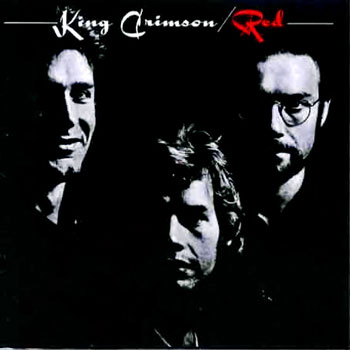 Out of the rarefied list of truly classic progressive rock bands, King Crimson stands as the thorniest of the lot. You can ask someone on the street to name a Genesis song and they should be able to oblige. A Yes song, maybe. King Crimson? Not hardly. And yet of those three names, it is Crimson that has had the heaviest impact on modern music, specifically metal. You can hear the threads of building, breaking down and then rebuilding a song in groups like Tool and Porcupine Tree. The sinister heaviness underneath Robert Fripp’s guitar constructions was a major component for the downtuned nu-metal of the late ’90s and early 2000s, even if Black Sabbath and Tony Iommi got most of the lip service. Even so, they never had a top 10 hit, which given Fripp’s somewhat contrarian nature, probably pleases him to no end.
Out of the rarefied list of truly classic progressive rock bands, King Crimson stands as the thorniest of the lot. You can ask someone on the street to name a Genesis song and they should be able to oblige. A Yes song, maybe. King Crimson? Not hardly. And yet of those three names, it is Crimson that has had the heaviest impact on modern music, specifically metal. You can hear the threads of building, breaking down and then rebuilding a song in groups like Tool and Porcupine Tree. The sinister heaviness underneath Robert Fripp’s guitar constructions was a major component for the downtuned nu-metal of the late ’90s and early 2000s, even if Black Sabbath and Tony Iommi got most of the lip service. Even so, they never had a top 10 hit, which given Fripp’s somewhat contrarian nature, probably pleases him to no end.
Forty years after the debut of In the Court of the Crimson King, Fripp has embarked on an ambitious project to not only remaster the band’s catalog, but with the help of Porcupine Tree’s Steven Wilson, create brand new surround sound mixes. Alongside the debut, the first wave also features the fan-polarizing Lizard and Red, the moment everything changed. Although the band had always dabbled in minor chords, free-jazz outbursts and improvisations, they always were tied to that rather flowery, poetic sense of prog rock that ticked off the regular rock fans mercilessly. Bowing in 1974, Red was a mean mother of a recording, the opening title track instrumental throbbing and stomping with the urgency of a runaway Caterpillar backhoe crashing through a glass cathedral. Joining in this power trio version of the band, John Wetton’s fuzzy, heavy bass does as much in trading lead lines as it does holding down the bottom end. Bill Bruford’s jazz-inflected sense of rhythm dives and weaves, but never gets in the way when it’s simply time to beat the hell out of the skins.
The signature track of the album is the epic closer “Starless,” which starts off with melodic swaths of mellotron and Wetton’s lyrics metaphorically denoting oncoming despair. Then when the song seems over, the bass just plunks along with a menacing triad, picks up the drums, then the guitar with a palpable sense of paranoia until everything just pops. By the end, the song’s primary melody rocks back with full force, a virtual template for construction that many would follow, to greater acclaim but perhaps lesser effect.
The remix sounds much clearer than the EG Records’ CD releases from over a decade ago. Definition of individual instruments is certainly enhanced, the low end has that punch we’ve come to expect from modern recordings, but the overall sound spectrum is never muddy and the highs have nice clarity, good tone and I never really noticed treble noise, something found frequently on remasters because the bass is manipulated at the expense of everything else. The set consists of two discs, the first being the standard CD while the second is a DVD with the higher resolution versions. There are also a few videos on the DVD, live recordings from a French television program, all of which have that haphazard ’70s music television charm, meaning of course that the effects employed by the producers are at turns goofy, dated and occasionally unintentionally creepy.
Of the earlier King Crimson albums, Red is the place to begin. It shucks off the trappings of the original prog ethic and tears into a new, tougher sound. For today’s audiences, this is the most logical first step in discovering the band and this new anniversary edition couldn’t bring it across much better.
Red Anniversary Edition![]() is available from Amazon.com
is available from Amazon.com

![Reblog this post [with Zemanta]](http://img.zemanta.com/reblog_e.png?x-id=df7b6b02-3279-4e74-807a-714415962f1f)



Comments